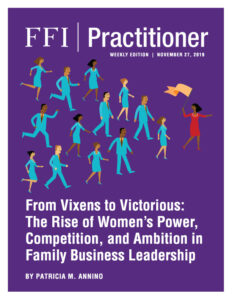
View this edition in our enhanced digital edition format with supporting visual insight and information.
This week, FFI Practitioner explores the evolving topic of the role of women in family businesses. Thank you to this week’s contributor, Patricia Annino, for her article, which is based on her presentation at the 2019 Global Conference. We hope you enjoy!
In a 1971 Harvard Business Review case study, “Conflicts that Plague Family Businesses,” the patriarch lamented that a problem faced by fathers and brothers occurred when wives or sisters got involved in the business. “When business is off, women complain. If the president wants to buy more equipment, the woman resists. If the wives hear complaints from employees or merchant friends, they make these complaints known at family gatherings. Thus,” the case study concludes, “the president is never free from the VIXENS who are constantly criticizing and second-guessing him.”
“Vixen” literally refers to a female fox, but its extended meaning is “a sexy woman” or “a shrew” – an aggressively assertive woman. We seem to have no deprecating name for aggressively assertive men, but we have several for women. “Bossy” for example, is another way to express the negative reaction that women get if they talk in ways that are expected from someone in authority.
It is no surprise, therefore, that in 1986 Dr. Mathilde Salganicoff wrote that daughters faced a constant struggle to be heard in family businesses. They had to constantly prove themselves as someone who could get the job done. “Even with dedication,” she wrote, “most women in family-owned businesses are still finding themselves denied the goal they seek – succeeding Dad.” She stated that virtually all experts agreed that family business owners would only choose a daughter to succeed them as a last resort – and maybe not even then.
But the tide was turning.
That same year, Dr. Leon Danco, considered among the nation’s foremost authorities on family-owned business, wrote that the big issue was the father’s acceptance of the daughter as leader, not the daughter’s competence. He followed that up years later by declaring, “There is no question that leadership in the 21st century will demand commitment from the best of us and this is not the time to limit participation to only one half of that population, especially when in this long-ignored half there are so many motivated, deeply committed, well-educated and self-prepared” women.
The tidal wave of change continued.
A 2014 Ernst & Young study showed that women (mainly daughters) were increasingly being selected to lead family-owned businesses. In that study, 70% of family businesses reported considering a woman for their next CEO spot and 30% were strongly considering a woman for that spot.
In 2016, Carrie Hall of Ernst & Young wrote that with greater number of women in leadership roles, the world’s largest, most profitable family businesses were thriving. “They and their employees benefit from women’s long-term approach to management, more inclusive environments and broader purposes” she wrote. “These market leaders offer exceptional professional opportunities to both men and women and to family members and non-family members. At a time when gender parity remains elusive at all levels of business management, family firms are especially compelling options for women to aspire to lead. In addition, they set an example for all businesses that want to succeed and advance women.”
As Victor Hugo said, nothing is stronger than an idea whose time has come.
A key reason for the rise of female leadership in family businesses is that women themselves are becoming more comfortable with their own ambition and power. Competition is no longer a dirty word for women. They may compete differently than men, but they have given themselves permission to compete. Ambition is no longer a dirty word. Women now claim the power that comes with ambition. Ambition is a very personal drive that keeps aiming higher to achieve full potential. Women have learned that the days of waiting for someone else to anoint you with power are gone. The power is here to claim. Once the power is claimed, it is up to the woman to decide what the velocity of her own power will be. Women are now stepping into their own power, claiming ambition and openly competing for leadership positions in family businesses.
The one and only question a retiring family business owner will need to answer is: “Who is the best person to manage the company?”
To reach the goal of leadership in the family business women should:
- Seek role models.
- Seek a mentor.
- Continue to educate themselves on business strategies.
- Be sure to continue to work on all weaknesses.
- Understand the importance of an inclusive environment which is as much focused on people as financial results.
- Network with other women in leadership positions.
- Be bold.
We are in a rapidly changing world. There is no doubt that there will be increased opportunities ahead for women to lead their family businesses. The future is one of choice.
About the Contributor
 Patricia M. Annino is an attorney with Rimôn, P.C. in Boston. A former member of the FFI board of directors and a frequent contributor to FFI Practitioner, she has been voted by her peers as one of the Best Lawyers in America, Estate Planner of the Year and EuroMoney’s “Best in Wealth Management — USA.”.
Patricia M. Annino is an attorney with Rimôn, P.C. in Boston. A former member of the FFI board of directors and a frequent contributor to FFI Practitioner, she has been voted by her peers as one of the Best Lawyers in America, Estate Planner of the Year and EuroMoney’s “Best in Wealth Management — USA.”.
About Rimôn, P.C.
Rimôn, P.C. is a global law firm serving the needs of individuals and family businesses.

View this edition in our enhanced digital edition format with supporting visual insight and information.





